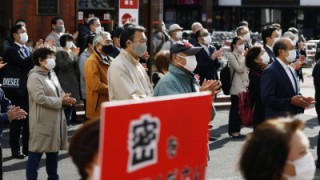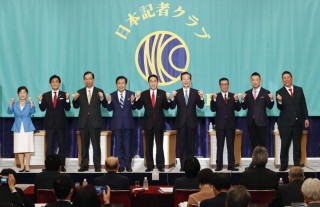Loading
Search
▼ Campaigning Begins For Japan's Oct. 31 General Election
- Category:Event
Campaigning for Japan's Oct. 31 general election began Tuesday, with new Prime Minister Fumio Kishida seeking a mandate for his COVID-19 and economic policies while opposition parties are banding together in a bid to loosen the ruling coalition's grip on power.
Candidates are contesting 465 seats in the House of Representatives, the powerful lower chamber of parliament, with the Liberal Democratic Party and smaller partner Komeito looking to retain their overall majority.
Kishida, who took office Oct. 4, has pledged to realize economic growth and redistribute wealth to the middle class in a course correction of "Abenomics," which has been criticized as helping lift corporate earnings and share prices but failing to spark wage gains.
A stimulus package worth "tens of trillions of yen" to deal with the coronavirus pandemic will be drawn up within the year, he has said.
"We will distribute the fruits of economic growth in the form of salaries and income. We will break new ground for Japan by realizing a virtuous cycle of growth and distribution," Kishida said in his first stump speech in Fukushima, northeastern Japan.
In his absence from Tokyo, North Korea fired two ballistic missiles into the Sea of Japan in the morning, prompting Kishida to instruct the relevant agencies to gather information.
Opposition groups including the Constitutional Democratic Party of Japan argue the consumption tax should be lowered from the current 10 percent and shift the burden to wealthy people and corporations, taking aim at the prime minister's backpedaling on promises to raise the capital gains tax.
"We have concrete plans for reviving Japan," said Yukio Edano, head of the CDPJ, which has been emphasizing the redistribution of wealth.
"Without distribution, there is no growth. We need your power to change politics," he said in Matsue, which is known as a conservative stronghold, in western Japan.
Kishida dissolved the lower house last Thursday for the first general election in four years. With just 17 days from the dissolution until ballots are cast, it is the quickest turnaround in the postwar era.
The decision to bring the date forward rather than wait until early November, as had been expected, was apparently aimed at capitalizing on a nationwide dip in COVID-19 cases and the fact that newly formed Cabinets typically enjoy high public support.
Kishida has met a less-than-enthusiastic response, however, with the approval rating for his lineup of ministers hovering around 55 percent in a Kyodo News survey conducted over the weekend.
Just under 30 percent of respondents said they will vote for the LDP in the proportional representation portion of the general election and 4.7 percent went with Komeito, while 9.7 percent said they will choose the CDPJ. Around 40 percent said they are undecided.
As well as being a gauge of confidence in Kishida, a 64-year-old former foreign minister, the vote will be a referendum on nearly nine years of LDP governance under his predecessors Shinzo Abe and Yoshihide Suga.
Kishida has said he will claim victory if the ruling coalition can retain an overall majority of at least 233 seats, a low bar considering it held 305 prior to the lower house's dissolution.
The CDPJ, led by former Chief Cabinet Secretary Yukio Edano, is looking to add to its 110 seats, stepping up cooperation with other opposition groups including the Japanese Communist Party by consolidating their candidates for a better chance at winning single-seat districts.
The opposition has also criticized Kishida's unwillingness to allow married couples to adopt separate surnames and recognize same-sex marriage, and vowed to reduce carbon emissions without using nuclear power.
The LDP, meanwhile, is promising to bolster Japan's medical system against future outbreaks of COVID-19 and boost defense spending amid China's growing assertiveness and missile threats from North Korea, pointing to the CDPJ's alliance with the JCP despite their vastly differing foreign policy stances as proof they are unfit to govern.
The previous general election was held in October 2017 under Abe, with the ruling coalition soundly defeating a fractured opposition amid low voter turnout.
The LDP has only been ousted from power twice since its founding in 1955, most recently from 2009 to 2012 by the CDPJ's forerunner, the Democratic Party of Japan.
The CDPJ, led by former Chief Cabinet Secretary Yukio Edano, is looking to add to its 110 seats, stepping up cooperation with other opposition groups including the Japanese Communist Party by consolidating their candidates for a better chance at winning single-seat districts.
The opposition has also criticized Kishida's unwillingness to allow married couples to adopt separate surnames and recognize same-sex marriage, and vowed to reduce carbon emissions without using nuclear power.
The LDP, meanwhile, is promising to bolster Japan's medical system against future outbreaks of COVID-19 and boost defense spending amid China's growing assertiveness and missile threats from North Korea, pointing to the CDPJ's alliance with the JCP despite their vastly differing foreign policy stances as proof they are unfit to govern.
The previous general election was held in October 2017 under Abe, with the ruling coalition soundly defeating a fractured opposition amid low voter turnout.
The LDP has only been ousted from power twice since its founding in 1955, most recently from 2009 to 2012 by the CDPJ's forerunner, the Democratic Party of Japan.
- October 19, 2021
- Comment (0)
- Trackback(0)



